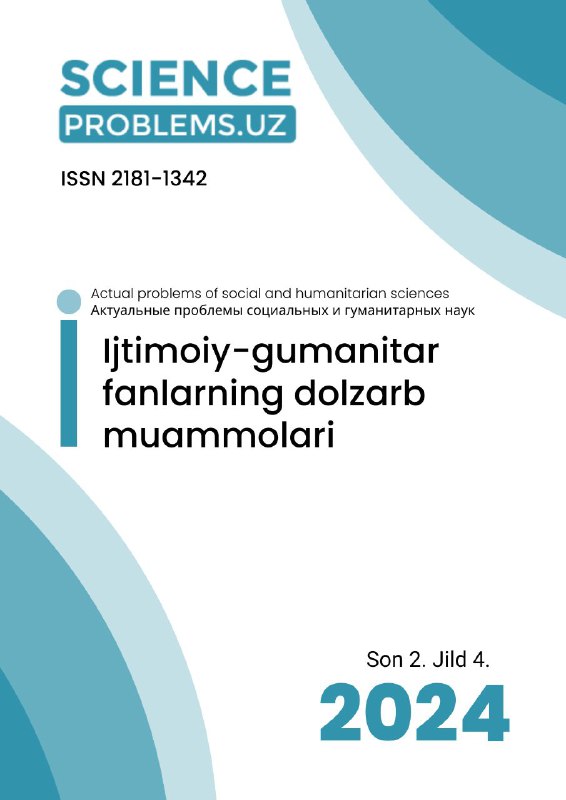METAFORALARNING O’ZBEKCHA TARJIMASIGA KOGNITIV YONDASHUV
Kalit so'zlar
https://doi.org/10.47390/SPR1342V4I2Y2024N21Kalit so'zlar
kognitiv tilshunoslik, metaforalar, pragmatika, tarjimada kognitiv muvofiqlikAnnotasiya
Ushbu maqolada kognitiv tilshunoslikda metaforalarning talqini haqida so’z boradi. Metaforalar bir jismning, voqelikning, materiyaning boshqacha so’zlar bilar atash san’ati bo’lib, uning ildizi qadimgi davrlarga borib taqaladi. Tabiiy jarayonlar in’inikosida paydo bo’lgan metaforalar, o’z-o’zidan tarixiy, ijtimoiy, ekologik, siyosiy jarayonlar natijasida o’zgarishlarga uchraydi. Asrlar davomida metaforalarga bo'lgan qiziqish bir oz sekinlashdi. Chunki olimlar metafolarni shunchaki bir jism, hodisa yoki voqelikni boshqacha nom bilan tasvirlash deb hisoblab kelishgan. Ammo 20-asrga kelib til hodisalariga antrposentrik jihatdan yondashuv ilgari surilgandan so’ng, tilning barcha jihatlari qatorida metaforalarga ham pragmatik, lingvamadaniy va umuman kognitiv yondashish lozimligini taqozo qildi. Maqolada turli davrlarda yashab o’tgan olimlar va tadqiqodchlarning metaforalar borasidagi fikri va qarashlariga murojaat qilingan. Shu bilan birgalikda ba’zi bir metaforalar kognitiv tahlil qilinib, tarjimada ularni ifodalovchi ekvivalentlarini qanday tanlash kerakligi haqida so’z boradi.
Manbalar
Alex Gomez-Marin.General Commentary: Metaphors We Live By. 29 June 2022. Alicante, Spain . doi: 10.3389/fcomp.2022.890531
Andrew Ortony. “Metaphor and Thought”. Published by the Press Syndicate of the University of Cambridge.The Pitt Building, Trumpington Street, Cambridge CB2
Aristotle. 1954. Rhetoric. (Trans. by Rhys Roberts). New York: The Modern
Attila Imre. Metaphors in Cognitive Linguistics.Eger Journal of English Studies X (2010) 71–81
Brugman C. 1981. Story of Over. MA thesis. Berkeley: University of California. Reproduced by the Indiana University Linguistics Club.
Chomsky N. 1972. Language and Mind. Enlarged ed. New York, MIT: Harcourt Brace Jovanovich, Inc.
Cooper D. 1986. Metaphor. Oxford: Blackwell.
Elisabeth Camp. Metaphor And That Certain “Je Ne Sais Quoi”. Philosophical Studies (2006) 129:1-25 _ Springer 2006 DOI 10.1007/s11098-005-3019-5
Elisabeth Camp. Metaphor in the Mind: The Cognition of Metaphor1.
George Lakoff, Mark Johnson. The Metaphorical Structure of the Human Conceptual System. Cognitive Science 4, 195-208 (1980)
George Lakoff. 2005. The Brains Concepts: The Role of the Sensory –Mtor System in Conceptual knowledge. Cognitive Neuropsycology, 22 (3/4), 455–479.
Kövecses Z. 2005. Metaphor in culture: Universality and variation. Cambridge, MA/New York: Cambridge University Press.
Lakoff G., Johnson M. 1999. Philosophy in the Flesh: The Embodied Mind and Its Challenge to Western Thought. New York: Basic Books.
Lakoff G., Johnson, M. 1980. Metaphors We Live By. Chicago and London: The University of Chicago Press, completed with an Afterword in 2003.
Lakoff George. Conceptual Metaphor in Everyday Language. 1980-08-01. The Journal of Philosophy, 77(8)
Levin, S. R. (1977). The Semantic of metaphor. Baltimore, MD: Johns Hopkins University Press
Martin J.R.Metaphors we feel by: stratal tension. Journal of World Languages. 2020, VOL. 6, NOS. 1–2, 8–26 https://doi.org/10.1080/21698252.2020.1720158
Michiel Leezenberg. 2012. From Cognitive Linguistics to Social Science: Thirty Years after Metaphors We Live By. University of Amsterdam
Mittelberg, I., Farmer, T.A., & Waugh, L.R. 2007. They actually said that? An introduction to working with usage data through discourse and corpus analysis. In M. Gonzalez-Marquez, I. Mittelberg, S. coulson & M. J. Spivey (eds.) Methods in Cognitive Lingvistics. Amsterdam: John Benjamins, 20-52








